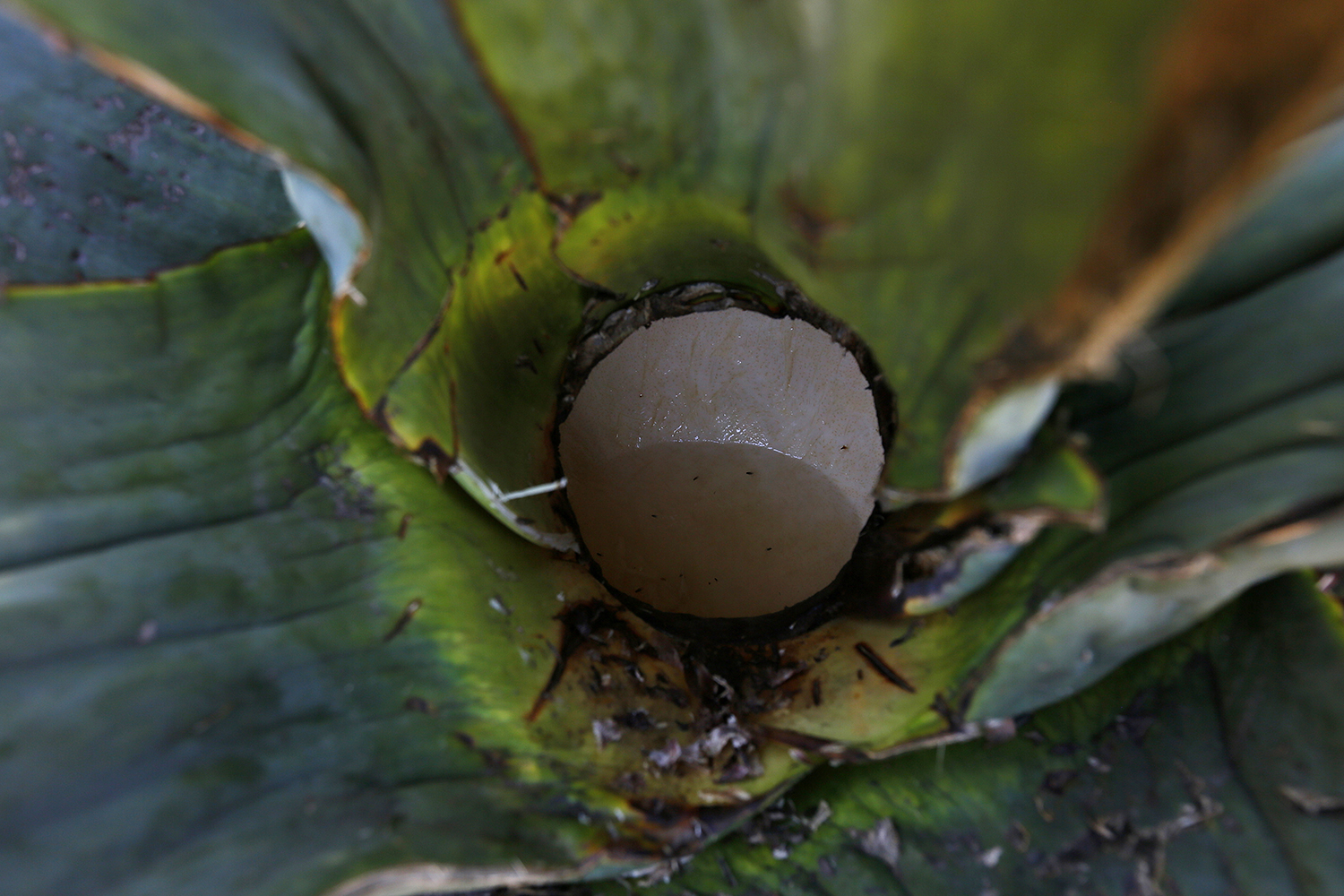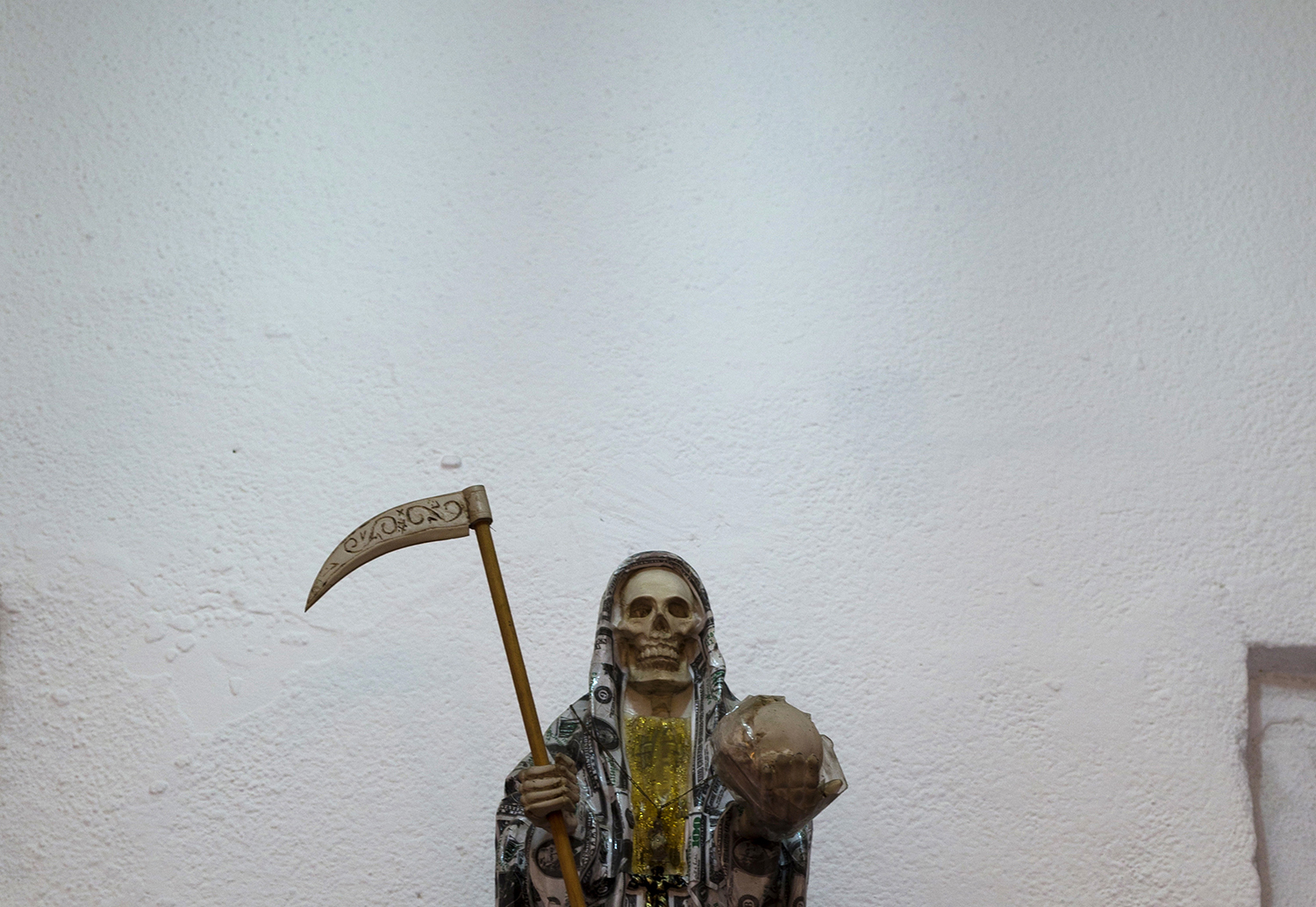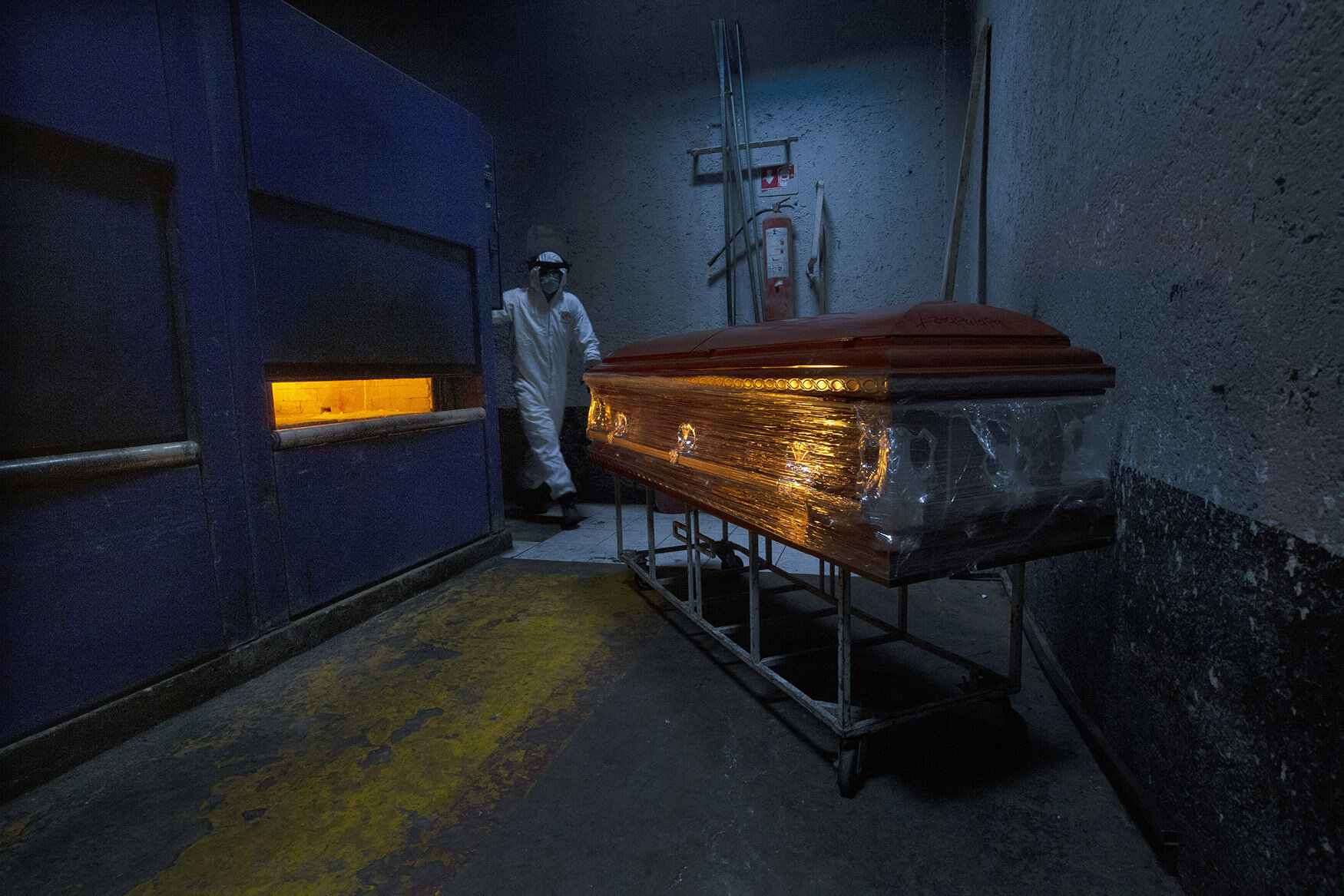Mexico's ancient beverage of pulque makes a comeback

Mexicans have been brewing pulque from the juice of cactus-like maguey plants for centuries, but the viscous, beer-like beverage fell out of favor starting in the 1970s as pulque got a bad reputation as a peasant's drink. The number of producers, consumers and bars known as "pulquerias" dwindled.
But now, the nutrient-rich drink is making a comeback among a new generation of Mexicans.
In this March 6, 2015 photo, pulque producer Juan Ortega Ramirez, accompanied by his donkey Cantia, extracts the sugary liquid, or "aguamiel," from the hollow section of a maguey plant in Santiago Cuautlalpan, Mexico. Pulque producers worry about the old maguey fields that once sustained entire haciendas as they are torn up to make way for subdivisions and shopping malls. (AP Photo/Marco Ugarte)
In this Dec. 2, 2016 photo, a couple sit outside La Nuclear pulqueria in Mexico City. Mexicans have been brewing pulque from the juice of cactus-like maguey plants for centuries, but the viscous, beer-like beverage fell out of favor starting in the 1970s as pulque got a reputation as a poor man's drink. (AP Photo/Marco Ugarte)
The Aztecs of Mexico's central highlands revered pulque, pronounced POOL-kay, reserving it for the highest social classes and the most august occasions.
Today, pulque is available in numerous flavors and strengths and you are as likely to see a tattooed millennial couple sipping a liter container of strawberry-flavored pulque outside a hipster bar as the farmers in cowboy hats who make and drink it in the countryside.
But don't expect it to appear on the shelves of the local liquor store.
In this Nov. 30, 2016 photo, pulque producer Antonio Gomez extracts the sugary liquid or "aguamiel," from the hollow section of a maguey plant, in Santiago Cuautlalpan, Mexico. Gomez said pulque was once served in some parts of Mexico in the morning, as well as for health reasons. "The old people, they say that before, they didn't drink coffee; they had some pulque, tortillas and beans and that was their breakfast," he said. (AP Photo/Marco Ugarte)
This Nov. 30, 2016 photo shows the sugary liquid or "aguamiel," in the hollow section of a maguey plant, in Santiago Cuautlalpan, Mexico. The liquid at this stage is barely alcoholic, if at all. The liquid goes into plastic tanks to ferment, to make pulque, pronounced POOL-kay, a viscous, beer-like beverage. (AP Photo/Marco Ugarte)
For decades, attempts have failed to can or bottle the milky white liquid that continues to ferment quickly after being produced.
Pulque long had a reputation as the drink of poor farmers, and many assumed it was produced under unsanitary conditions — something its fans say is not true.
Antonio Gomez, a pulque producer in the community of Santiago Cuautlalpan in Tepotzotlan municipality just north of Mexico City, is among those who make the drink the old fashioned way, by hollowing out the pulpy heart of the region's maguey plant and using a sort of suction pipe to pull out the sugary liquid that collects in the hollow section. The liquid at that stage, known as "aguamiel," is barely alcoholic, if at all.
In this Nov. 30, 2016 photo, pulque producer Antonio Gomez speaks during an interview on his ranch in Santiago Cuautlalpan, Mexico. Gomez is among those who make the drink the old fashioned way, by hollowing out the pulpy heart of the region's maguey plant and using a sort of suction pipe to pull out the sugary liquid that collects in the hollow section. (AP Photo/Marco Ugarte)
In this Nov. 30, 2016 photo, pulque producer Ramon Cruz pours the milky white liquid into a pot, in Tepotzotlan, Mexico. The liquid goes into plastic tanks to ferment. After fermentation, it's about as strong as the average beer. (AP Photo/Marco Ugarte)
This Nov. 30, 2016 photo shows a vat of pulque during preparation in Tepotzotlan, Mexico. For decades, attempts have failed to can or bottle the milky white liquid that continues to ferment quickly after being produced. (AP Photo/Marco Ugarte)
Pulque-themed photos decorate a wall in Tepotzotlan, Mexico, Wednesday, Nov. 30, 2016. Mexicans have been brewing pulque from the juice of cactus-like maguey plants for centuries, but the viscous, beer-like beverage fell out of favor starting in the 1970s as pulque got a reputation as a poor man's drink. (AP Photo/Marco Ugarte)
The liquid goes into plastic tanks to ferment, often for as little as 12 hours. With the addition of fruit juices, it comes in flavors such as guava, mango, coconut, strawberry and pineapple. At 6 percent alcohol content after fermentation, it's about as strong as the average beer.
Gomez said pulque was once served in some parts of Mexico in the morning, as well as for health reasons.
"The old people, they say that before, they didn't drink coffee; they had some pulque, tortillas and beans and that was their breakfast," he said.
"A lot of doctors are prescribing it as medicine," Gomez said. "A diabetic person, for example, should drink strong pulque."
Gomez said he worries about the old maguey fields that once sustained entire haciendas as they are torn up to make way for subdivisions and shopping malls.
"More than anything else, we have to continue planting magueys ... and take care of the fields, because other people, unfortunately, are coming out here to develop and build houses," he said.
In areas around Tepotzotlan, pulque fanatics including farmers, growers and urban residents for the last three years have organized a sort of pulque caravan complete with food, horseback riding, music, pulque-drinking competitions and burros laden with wooden barrels of the beverage.
Carlos Eladio Contreras, a festival organizer, said "it's about rescuing traditions, right?"
"Before, drinking pulque was looked down on, people would say, "Oh, no, drinking pulque is really low class," he said. "Now, fortunately, the young people are taking this up, rescuing something, its essence, and rescue the identity of their people and the land where pulque is born, which is the maguey fields."
In this Nov. 20, 2016 photo, a woman drinks pulque from a gourd canteen, during a pulque festival in Santiago Cuautlalpan, Mexico. "Before, drinking pulque was looked down on, people would say, "Oh, no, drinking pulque is really low class," said Carlos Eladio, a festival organizer. (AP Photo/Marco Ugarte)
In this Nov. 20, 2016 photo, vendors sit in the bed of a truck, with handmade signs attached to the truck's tailgate advertising food, coffee and pulque for sale, during a pulque festival in Santiago Cuautlalpan, Mexico. The middle sign displays a well known pulque witticism that reads in Spanish: "Blessed pulque, sweet torment. What are you doing outside? Come on in!" (AP Photo/Marco Ugarte)
In this Nov. 20, 2016 photo, participants race to a table in a pulque-drinking competition, during a pulque caravan in Santiago Cuautlalpan, Mexico. Pulque fanatics including farmers, growers and urban residents for the last three years have organized the caravan that include food, horseback riding, music, and burros laden with wooden barrels of the beverage. (AP Photo/Marco Ugarte)
In this Nov. 20, 2016 photo, a guitarist sings during a pulque caravan in Santiago Cuautlalpan, Mexico. Pulque long had a reputation as the drink of poor farmers, and many assumed it was produced under unsanitary conditions, something its fans say is not true. The nutrient-rich drink is making a comeback among a new generation of Mexicans. (AP Photo/Marco Ugarte)
In this Nov. 20, 2016 photo, members of a band take a break during a pulque caravan, in Santiago Cuautlalpan, Mexico. The Aztecs of Mexico's central highlands revered pulque, pronounced POOL-kay, reserving it for the highest social classes and the most august occasions. (AP Photo/Marco Ugarte)
Ricardo Gallardo Leon is a bearded 20-something Mexico City resident who drinks at the "Las Duelistas" pulqueria downtown.
"I like this because it is something we inherited from our ancestors and because my family also drinks it," said Gallardo Leon. "It's something we shouldn't lose."
The mainly small, artisanal producers complain that tax codes, health codes and commercial requirements have conspired to keep their pulque businesses small.
Jesus Hernandez, another organizer of the pulque caravan, said the government requirements are almost impossible to comply with, so he sells the beverage out of tanks in the back of his truck.
When seeing the cost required to become a registered producer, Hernandez whistles and says, "Man, if I had that much money, I'd be doing something else for a living, right?"
In this Dec. 3, 2016 photo, patrons stand in a doorway of Las Duelistas pulqueria, in Mexico City. Artisanal producers complain that tax codes, health codes and commercial requirements have conspired to keep their pulque businesses small. (AP Photo/Marco Ugarte)
This Dec. 3, 2016 photo shows the pulqueria Las Duelistas overflowing with patrons, in Mexico City. Mexicans have been brewing pulque from the juice of cactus-like maguey plants for centuries, but the viscous, beer-like beverage fell out of favor starting in the 1970s as pulque got a bad reputation as a peasant's drink. The nutrient-rich drink is making a comeback among a new generation of Mexicans. (AP Photo/Marco Ugarte)
A man fills a glass with pulque at Las Duelistas pulqueria in Mexico City, Saturday, Dec. 3, 2016. Mexicans have been brewing pulque from the juice of cactus-like maguey plants for centuries, but the viscous, beer-like beverage fell out of favor starting in the 1970s. Now, among a new generation of Mexican hipsters, the nutrient-rich drink, which is available in a number of flavors and strengths, is making a comeback. (AP Photo/Marco Ugarte)
In this Dec. 3, 2016 photo, glasses filled with pulque are delivered to a customer at Las Duelistas pulqueria, in Mexico City. Pulque is available in numerous flavors and strengths, but not on the shelves of local liquor stores. For decades, attempts have failed to can or bottle the milky white liquid that continues to ferment quickly after being produced. (AP Photo/Marco Ugarte)
Text from AP news story, Mexico's ancient beverage of pulque makes a comeback, by Teresa De Miguel
Follow photographer Marco Ugarte
See these photos on APImages
Follow AP photographers on Twitter
Written content on this site is not created by the editorial department of AP, unless otherwise noted.





